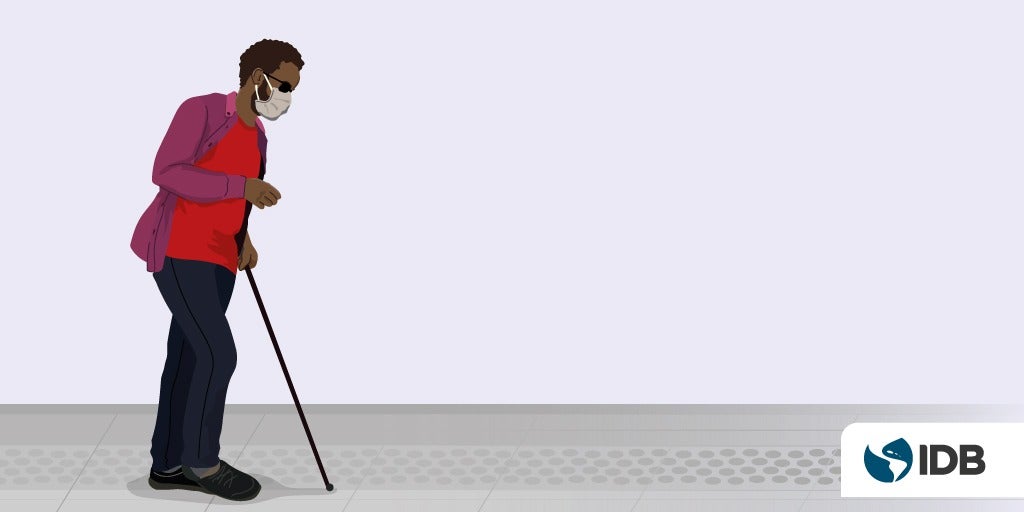Matías’s experience
Many of us are waiting anxiously for the day when we can have access to a COVID-19 vaccine. People with disabilities are no different. Like everyone else, many people with disabilities want and need to be vaccinated. This is also the case for Matías Ferreyra, university professor, president of the Latin American Union of the Blind and member of the Inter-American Institute on Disability and Inclusive Development (IIDI). Matías has the same reasons for wanting to be vaccinated as everyone else, but like other people with disabilities, he faces more barriers to accessing the vaccine.
“(…) I use screen readers, so I need websites and mobile applications to be accessible. Due to the pandemic, there was a rapid digitization given the necessity to have virtual access to more things, including vaccination registration. In this fast advancement, many accessibility issues were not contemplated. For example, in the online application to register for the vaccine in my province, it is not that all the information that is there cannot be read, because it can be read, but it does not have labeled buttons, and well, so a screen reader does not read them. I have low vision so by zooming in I can kind of read it, but it is not easy either. It causes me to spend a lot of time, stress and so on.”
Matías is not the only person with a disability who must worry about the barriers in the process of seeking vaccination against COVID-19. Imagine that all the information about the vaccination process is in a language that you do not understand or when you arrive at the vaccination site, there is a cliff between you and the clinic. People with disabilities face similar obstacles. This is a matter of equity, not preferential treatment. For this reason, it is essential that authorities consider the needs of people with disabilities in the implementation of their vaccination plans.
Accesible communication campaigns
To begin with, plans should consider the accessibility of communication materials including by using sign language interpretation, accessible websites and simple language formats. It is key that the information is accessible so that people know how, when and where to get vaccinated, but also, because there may be people with disabilities (like everyone else) who hesitant of the vaccine. To reach vulnerable populations, it is ideal that the information be disseminated through leaders, in this case, organizations of and for people with disabilities, such as Matías.
“Recently I was in a Whatsapp group with other people with disabilities, and a young guy with a visual disability asked me if he should get vaccinated, and well, my suggestion was that he consult with his doctor because it is important to get vaccinated. I think he did, but as you say, there this person trusted more in the opinion of his peers than in a medical voice.”
Accessibility and consent during vaccination
Creating accessible communication campaigns is the first step, but what happens when a person like Matías goes to get vaccinated? It is necessary to ensure that vaccination sites are accessible. Reasonable accommodation request protocols can be developed in order to request accommodations such as the presence of a sign language interpreter, curbside vaccinations, home vaccinations, documents in Braille, among other accommodations. The implementation of accessible vaccination sites can go hand in hand with the deployment of mobile vaccination campaigns, which can be used to reach people with disabilities who do not have access to accessible transportation.
“I think it is extremely necessary to consider the needs of people with disabilities at three stages of the vaccination process. The first has to do with the arrival, registration, and verification of information. The second moment is the moment of the vaccination itself, which has to be carried out assertively with reasonable accommodations, accessible information, and without minimizing the person’s decision-making ability, so that they have an informed consent that they are being vaccination. And well, there is a third moment which corresponds to the subsequent follow-up to verify that the person does not have adverse reactions, and thus, for example, a phone call to a person who is deaf is not accessible. A video call with sign language interpretation or a text message would be better.”
As Matías says, it is key to understand that receiving the vaccine must be through free and informed consent. If people with disabilities are not allowed to consent to the vaccine themselves, it could be a violation of their legal capacity, that is, the right that all adults have to make our own decisions, including health decisions. People with disabilities are often denied this right under the false claim that they do not have the mental aptitude to make their own decisions. There must be a guarantee of consenting oneself and not through an unofficial guardian. It is essential to train health personnel on this subject and create accessible consent forms and protocols.
All these considerations can be implemented to ensure the access of people with disabilities like Matías to the vaccine. It is important to know that the more people that are vaccinated, the closer we are to reaching herd immunity to COVID-19.
Also, follow are series on equity in vaccine distribution to continue learning more about this topic.
The author thanks Matías Ferreyra for the interview provided for this blog.


Felicitaciones por la preocupación de informar sobre la importancia de la accesibilidad, importancia de la información y el respeto a los derechos de las personas, especialmente para quienes padecemos alguna discapacidad. Porque no solo es cuestión de la discapacidad sino que de igualdad.